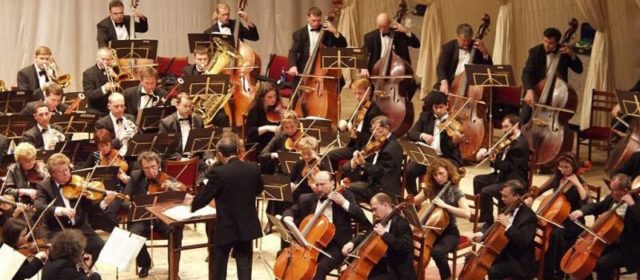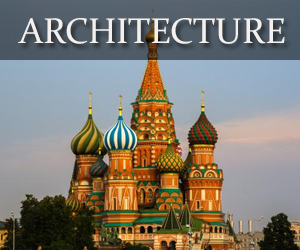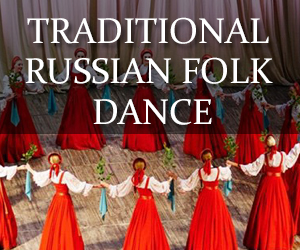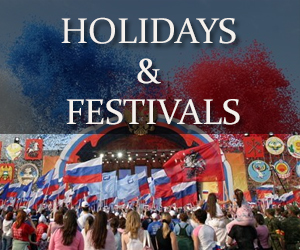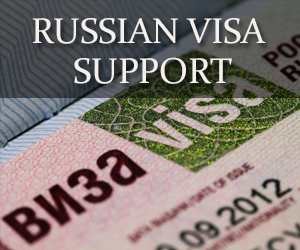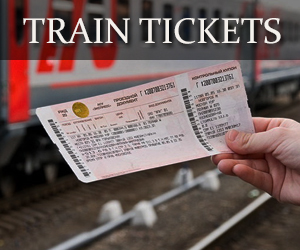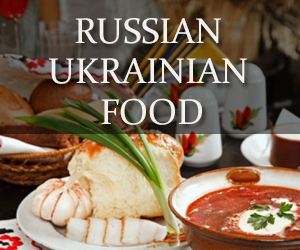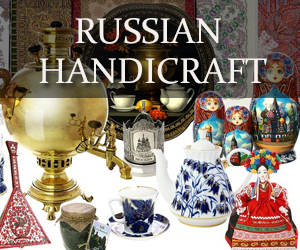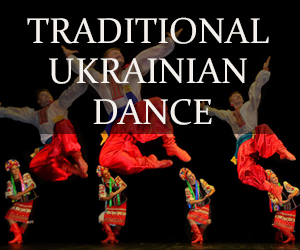Russian classical music has a proud history of celebrated composers, conductors and musicians. For aficionados of classical music and for those who will be visiting Russia and Ukraine’s historic concert venues, we’ve created a overview of this cherished art form. Included is a brief history of classical music in Russia, CDs, LPs and mp3s with the works of great Russian composers, as well as a list of must see concert halls.
Russian Classical Music Background
Classical music in Russia can be broken down into several different periods of the Classical, Romantic, and Soviet eras. Throughout each period, Russian and Soviet conservatories have produced numerous celebrated composers, as well as a wealth of renowned musicians and conductors.
Some of Russia’s most recognized musicians include pianists Vladimir Horowitz, Sviatoslav Richter and Emil Gilels, violinists David Oistrakh and Gidon Kremer, as well as one of the greatest cellists of the 20th century, Mstislav Rostropovich.
Western music tradition was originally introduced to Russia by Czar Peter the Great in the early 18th century as part of his reforms to modernize Russian society. During the reign of subsequent Russian rulers, the imperial court invited many prominent Italian musicians who brought with them Classical traditions of opera, chamber music and symphony. While this foreign influence helped inspire Russia’s early Classical musicians, Russian composers were also sent abroad to refine their skills. A few of the early Russian / Ukrainian composers of the Classical period include the likes of Maksim Berezovsky, Dmitri Bortniansky, and Artem Vedel.
It didn’t take long until a number of Russia’s Classical composers started to use native music traditions (Russian themes and tunes, Russian – vernacular language) in their own compositions. The first to do so was Mikhail Glinka, the “father of Russian Classical music”. Glinka helped pave the way for a new generation of Russian composers who’s works – based on Russian history, folk tales and literature – are regarded as Romantic Nationalism. The most famous composers of this style, belonging to a group known as The Five (1856-1870), included Mily Balakirev, Alexander Borodin, César Cui, Modest Mussorgsky, and Nikolai Rimsky-Korsakov.
Another, more conservative, organization of the same era was the Russian Musical Society (RMS). Founded by brothers Anton and Nikolai Rubinstein in 1859, the RMS sought to broaden music training and raise musical standards in Russia. A forerunner to both the Saint Petersburg (1862) and Moscow (1866) Conservatories, the RMS was an integral catalyst to professional music education in Russia.
Training from Russia’s new conservatories, along with inspiration and tutelage from “The Five”, helped develop many great Romantic era composers of the 19th and early 20th centuries. A few familiar names include the great Peter Tchaikovsky, Sergei Rakhmaninov, Igor Stravinsky, Alexander Scriabin, and Sergei Prokofiev.
Radical social changes of the 1917 Russian Revolution brought about sweeping changes in Russian music. While some of Russia’s great composers and musicians fled abroad, others stayed behind and embraced experimental Avant-Garde style compositions. In 1923, the Association for Contemporary Music (ACM) was founded by Nikolai Roslavets as a means to facilitate and promote modernist, Avant-Garde music.
The Avant-Garde period, while innovative, was fairly short-lived. By the early 1930s experimental, ultra-modern forms of art, including music, fell out of favor with Joseph Stalin. The Soviet leader favored the style of Socialist Classicism, music that could be scrutinized and kept within the conforms of the broader Socialist policy.
A few distinguished names of early Socialist Classicism included composers Prokofiev and Dmitri Shostakovich. Falling under the scrutiny of the Union of Soviet Composers (established in 1932), Prokofiev and Shostakovich, like all Soviet composers of the era, were restricted from outside influence and expected to create patriotic scores, supportive of Communist ideology.
Anyone experimenting or deviating from the norm was branded a “formalist”, as was the harsh criticism towards Shostakovich after the 1934 release of his opera Lady Macbeth of the Mtsensk District.
Must Attend Concert Halls
Moscow Concert Halls
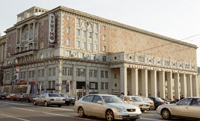 Tchaikovsky Concert Hall
Tchaikovsky Concert Hall
The main stage for the Moscow Philharmonic Society, the Tchaikovsky Concert Hall is one of the centers of musical and cultural life in Moscow. Officially opened in 1940 (to celebrate the one hundred year anniversary of Peter Tchaikovsky’s birth), the recently renovated, state-of-the-art concert hall can seat 1505 spectators and hosts roughly 300 performances per year. Apart from concerts staged by the Moscow Philharmony and local artists, the concert hall also hosts different international music festivals and invites some of the most famous troupes and orchestras from around the world as well.
address: 4/31, Triumphalnaya Ploshchad, Moscow
metro: Mayakovskaya
box office: daily 11:30am – 7:30pm (3pm – 4pm break)
website: ClassicalMusic.ru
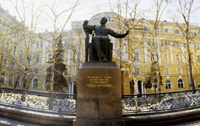 Moscow Tchaikovsky Conservatory
Moscow Tchaikovsky Conservatory
Founded by Nikolai Rubinstein in 1866, the Moscow Conservatory (now Moscow Tchaikovsky Conservatory – named in honor of the school’s former professor), is one of the oldest music education institutions in Russia. Not only a conservatory, it is also a splendid concert venue – recognized for its tradition, perfect acoustics and wonderful decorations. Consisting of the Grand Hall and four chamber halls (Small Hall, Rachmaninov Hall, Myaskovsky Hall and Conference Hall), the conservatory plays host to regular concerts, festivals and competitions (including the Tchaikovsky Competition), attracting some of the world’s best soloists, orchestras and ensembles.
address: 13/6, ulitsa Bolshaya Nikitskaya, Moscow
metro: Okhotny Ryad, Arbatskaya
website: MosConsv.ru
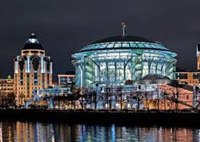 Moscow International Performing Arts Center
Moscow International Performing Arts Center
Also known as the Moscow International House of Music or Palace of Music, the Moscow International Performing Arts Center (MMDM) was formerly opened in 2002. The entire complex consists of three halls plus an outdoor musical terrace for summertime concerts. Svetlanovsky Hall (1699 seats) is designed for concerts of classical and popular music. Chamber Hall (556 seats) is specifically designed for chamber music performances. Theatre Hall (up to 524 seats) is quite versatile, staging various concerts, shows and presentations. The Performing Arts Center is home to the National Philharmonic Orchestra of Russia, the State Chamber Orchestra “Virtuosos of Moscow” and the Moscow Symphonic Orchestra “Russian Philharmony”. It is also home to a giant, German built organ consisting of 6000 metal and wooden pipes.
address: 52-8, Kosmodamianskaya naberezhnaya, Moscow
metro: Paveletskaya</>
box office: daily 11am – 10pm
website: MMDM.ru
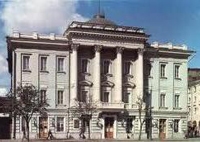 Palace of Unions
Palace of Unions
The Palace of Unions (Dom Soyuzov) is one of the most historic buildings in all of Moscow. Comprised of 4 halls – Hall #1 (Round Hall), Hall #2, October Hall and the Hall of Columns – it is the latter that has been playing host to symphony concerts since Nikolai Rubinstein first staged a performance for the Russian Musical Society in 1860. Since then the Hall of Columns has not only hosted world class concerts, but important conferences and political assemblies, as well as memorials for Soviet leaders.
address: 1, ulitsa Bolshaya Dmitrovka, Moscow
metro: Okhotny Ryad, Teatralnaya
website: DomSojuzov.ru
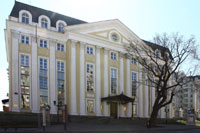 Galina Vishnevskaya Opera Center
Galina Vishnevskaya Opera Center
Opened in 2002 by legendary soprano Galina Vishnevskaya, the center gives recent graduates of musical conservatories the opportunity to work with some of the biggest names in Russian opera. Housed in a modern facility, the 336 seat theatre stages a diverse repertoire that not only includes full operas, but symphony and chamber orchestra concerts as well.
address: 25, ulitsa Ostozhenka, dom 1, Moscow
metro: Kropotkinskaya, Park Kultury
box office: daily 12 noon – 7pm (3pm – 4pm break)
website: Opera-Centre.ru
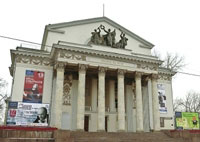 Yauza Palace
Yauza Palace
One of the most popular concert and theatre halls in Moscow, the classical theatre building has long been a center of modern culture in Russia’s capital. Although it has only operated as “Yauza Palace” since 2008, its role as a “public palace of culture” has been intact since the theatre’s 1903 construction. Historic location of Russia’s first KVN comedy show, the palace’s four, newly renovated concert halls now play host to a myriad of artistic events – from theatre and opera performances, symphony and chamber music concerts, to modern dance, jazz, rock and folk shows.
address: 1, Zhuravleva Ploshchad, Moscow
metros: Elektrozavodskaya
box office: daily 11am – 8pm (3pm – 4pm break)
website: Yauza-Palace.ru
Saint Petersburg Concert Halls
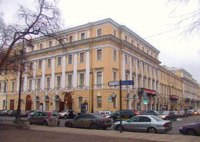 Shostakovich (Large) Philharmonic Hall
Shostakovich (Large) Philharmonic Hall
One of the most well-known concert halls in Russia and all of Europe, the Shostakovich Philharmonic Hall is bursting with history and prestige. It is home to the Saint Petersburg Philharmonic Society (Europe’s oldest, established in 1802) and plays host to two world renowned symphony orchestras – the Saint Petersburg Philharmonic Orchestra (Russia’s oldest, formed in 1882) and the Saint Petersburg Academic Symphony Orchestra (founded in 1931). Built in 1839, the hall itself has been the center of Russia’s musical life since the 1840s. With seating capacity for more than 1500 people, and an exquisite interior, its a treat to take in a concert and experience a part of Russia’s cultural heritage.
address: 2, ulitsa Mikhailovskaya, St Petersburg
metro: Nevsky Prospekt, Gostiny Dvor
box office: daily 11am – 7:30pm (3pm – 4pm break)
website: Philharmonia.spb.ru
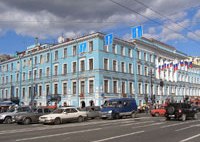 Glinka (Small) Philharmonic Chamber Hall
Glinka (Small) Philharmonic Chamber Hall
The “Small Hall” of the Saint Petersburg Philharmonic Society was inaugurated on May 15, 1949. Located on Nevsky Prospekt in the home of Prince Vasily Engelhardt, the building – as it stands today – dates back to 1830. Currently the Glinka Small Hall stages concerts of classical and contemporary chamber music and is the site of many international music festivals and competitions.
address: 30, Nevsky Prospekt, St Petersburg
metro: Nevsky Prospekt, Gostiny Dvor
box office: daily 11am – 8pm (3pm – 4pm break)
website: Philharmonia.spb.ru
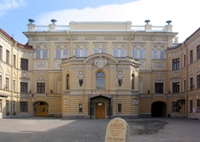 State Academic Capella of Saint Petersburg
State Academic Capella of Saint Petersburg
As old as Saint Petersburg itself, the State Academic Capella occupies a special place in the history of Russian musical culture. It was here that Russian professional art got its start, and it is here where you can still find exemplary concerts of choral, organ, symphony and chamber music. Built in 1889 on the bank of the Moika River, the Capella building is an architectural masterpiece for both its acoustics and decorative properties. Its the perfect venue to not only see performances of the world renowned State Academic Capella, but one of many international festivals as well. Annual music festivals (many which have become tradition) include: the Organ Music Festival, the Neva Choral Assemblies, the Schubert Festival, and the S.V. Rakhmaninov Festival.
address: 20, Reki Moiki naberezhnaya, St Petersburg
metro: Nevsky Prospekt, Gostiny Dvor
box office: daily 12 noon – 7pm (3pm – 4pm break)
website: Glinka-Capella.ru
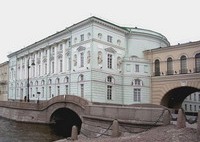 Hermitage Theatre
Hermitage Theatre
Built between 1783 and 1787, the Hermitage Theatre is one of the oldest theatres in all of Russia. One of five Hermitage buildings along the Palace Embankment of the Neva River, it served as a living theatre but for a brief time – until the death of Catherine the Great in 1796. It wasn’t until its 1989 restoration that it was reopened for theatrical performances. Today it is considered one of the best chamber music theatres in the world playing host to opera, ballet, orchestral and chamber music concerts.
address: 34, Dvortsovaya Naberezhnaya, St Petersburg
metro: Nevsky Prospekt, Gostiny Dvor
website: Balet-spb.ru, HermitageMuseum.org
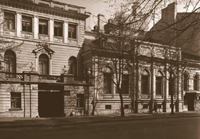 House of Composers
House of Composers
The House of Composers Concert Hall is home to a professional and creative music association known as the Saint Petersburg Union of Composers. Founded in 1932 (under the name Union of “Soviet” Composers), the organization moved into its current location at the historic 18th century mansion of Princess Gargina in 1948. Since then the hall has been staging symphonic, chamber and instrumental concerts as well as various music festivals.
address: 45, ulitsa Bolshaya Morskaya, St Petersburg
metro: Nevsky Prospekt, Gostiny Dvor
box office: daily 12 noon – 6pm
website: SPb-Composers.ru
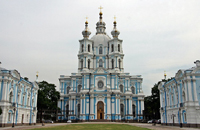 Smolny Cathedral
Smolny Cathedral
Perhaps one of the most unique “concert halls” found in Saint Petersburg is the Cathedral of Smolny Convent. Exhibiting a baroque exterior (1764) and a neo-classical interior (1835), the cathedral was designated a concert hall in 1982 and became home to the newly established Smolny Cathedral Chamber Choir in 1991. Performing a diverse repertoire of works from Russian and foreign composers to Russian folk songs, the ensemble has distinguished itself as one of the finest choirs in the city. In addition, famous symphony and chamber orchestras, renowned vocalists, dancers, and children’s choirs also perform in the white-pillared hall of Smolny Cathedral.
address: 1, Rastrelli Ploschad, St Petersburg
metro: Chernyshevskaya
box office: daily 11am – 5pm
website: Cathedral.ru
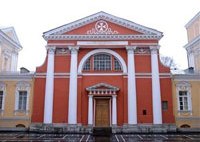 Maltese Chapel (Maltese Capella)
Maltese Chapel (Maltese Capella)
Built for Catholic knights of the Maltese Order, the Maltese Chapel was added to the left wing of the Vorontsov Palace in 1800. With seating to accommodate up to 1000 people, it has been staging concerts of organ music since 2006. Centerpiece of each concert is the historic German built Walcker organ – installed in 1909. Vocal, string and orchestral ensembles (and soloists) also regularly accompany the organ, performing a diverse range of classical and contemporary works.
address: 26, ulitsa Sadovaya
metro: Sadovaya, Sennaya Ploshchad
box office: Military Historical Museum of Artillery, Engineers
7 Alexander Park, Wednesday to Sunday from 11am – 5pm
website: MaltaCapella.ru
Kiev Classical Music Concert Halls
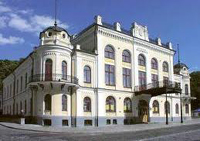 National Philharmonic
National Philharmonic
Presently called the National Philharmonic, and/or the Kiev Philharmonic, the building (built in 1882) originally went by the name Merchants’ House. Used by the Merchants’ Assembly for all sorts of cultural gatherings, it was particularly recognized for musical performances due to its amazing acoustics. The State Philharmonic Society was bequeathed the damaged, but still standing concert hall after the Germans’ retreat in 1944. Since that time the National Philharmonic Society of Ukraine (as its officially called) has used the facility to stage a wide range of programs. In the main concert hall, known as the Lysenko Hall of Columns, visitors can enjoy a full season of concerts by Symphony and Chamber Philharmonic Orchestras, folk ensembles, plus various music festivals and competitions with distinguished national and international participants.
address: 2, Vladimirsky Spusk street, Kiev
metro: Maidan Nezalezhnosti
website: Filarmonia.com.ua
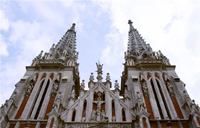 House of Organ and Chamber Music
House of Organ and Chamber Music
Located in St. Nicholas Roman Catholic Cathedral (built in 1909 and restored in 1980), the National House of Organ and Chamber Music of Ukraine is a splendid Gothic style church outfitted with a specially designed Rieger-Kloss pipe organ. Performances include organ recitals, plus choral, string and orchestral ensembles.
address: 77, Velyka Vasylkivska (Chervonoarmiyska) street
metro: Respublikansky Stadion
website: OrganHall.kiev.ua

